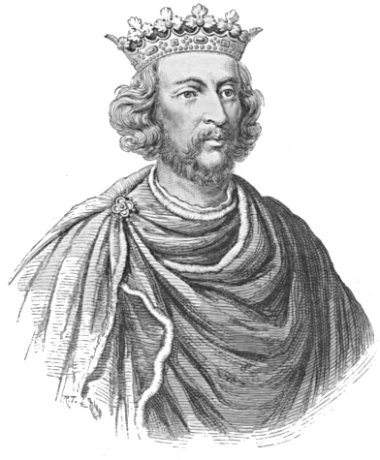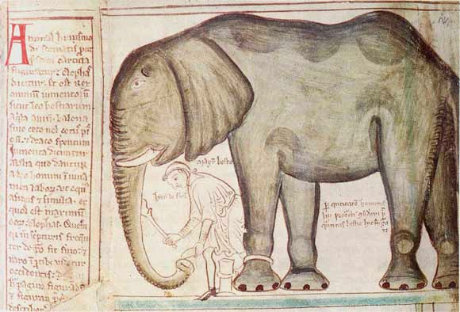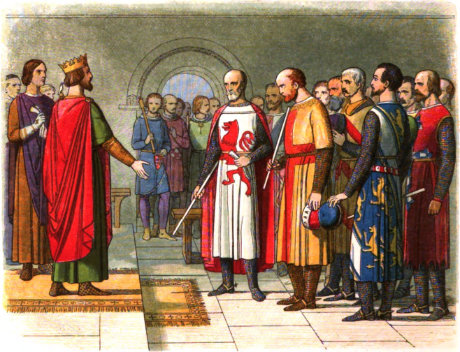Henry III and His Parliament
This illustration shows Henry III meeting his Parliament. He almost certainly hoped to raise some more taxes!
&npsp;
Henry III came to the throne at the age of 9 and remained king for over 50 years. Troubles with wealthy barons led to the establishment of Parliament and the House of Commons during his reign.

When Henry died in 1272, his eldest son Edward took over (Edward I).

Henry III's elephant, a gift from Louis IX of France
‘The Second Barons War in 1264’
The rhyme in this sentence is useful to remember the date of the Second Barons War.
A boy king
Henry was born in Winchester Castle (he was also known as Henry of Winchester). He inherited the throne when he was just nine years old. Despite having invited Louis of France to come and take the throne from King John, the English nobles now changed sides to support the young king and Louis was defeated and forced back to France. The barons looked after the kingdom for him until he was old enough to rule.
When Henry took power for himself in 1227, he promised to uphold the principles of the Magna Carta. But then he immediately angered his nobles by ignoring their advice, promoting his friends to positions of power in government and the church, and raising taxes.
Peace with France
Henry set about regaining some lands that his father had lost, but an unsuccessful war in France (1242) made him unpopular. The introduction of a new tax system also angered wealthy men. Henry eventually gave up his claim to lost lands and made peace with France. The French king, Louis IX’s wife was the sister of Henry’s wife Eleanor.
Parliament
His mother had married a Frenchman after the death of his father, King John, and the barons distrusted this French influence in the royal court. By 1258, the barons had had enough. They held a meeting to discuss what to do and called this meeting a ‘parliament’. Henry needed the support of his barons to be able to govern effectively. The barons agreed to give Henry the money he needed for his ventures if he accepted the ‘Provisions of Oxford’ – their idea to create a council of 15 barons as his advisors. One of these advisors was his sister’s husband, Simon de Montfort. But by 1261, Henry was tired of having to seek the council’s advice and dismissed them. This didn’t go down at all well.

Henry III and his Parliament
The Second Barons War
In the Second Barons War (1264), Montfort led an armed rebellion against the king. At the Battle of Lewes, Henry and his son Edward were taken prisoner, and Montfort ruled through ‘parliament’ for about a year in the king’s name. Montfort invited ordinary people from cities around the country to join the parliament, and the first meeting was held at the Palace of Westminster in January 1265.
Henry’s son Edward had other ideas. He escaped from captivity, killed Montfort at the Battle of Evesham (1265) and set his father free. Henry annulled (cancelled) the Provisions of Oxford the following year. Although Henry was back on the throne, his son Edward held greater respect. Edward left to fight in the Eighth Crusade in 1270, but when his father died in 1272, he returned to take the crown. Henry was buried in Westminster Abbey.
This illustration shows Henry III meeting his Parliament. He almost certainly hoped to raise some more taxes!
Here is a printable version of our "interesting facts" and short biography of Henry III, designed specially for children.